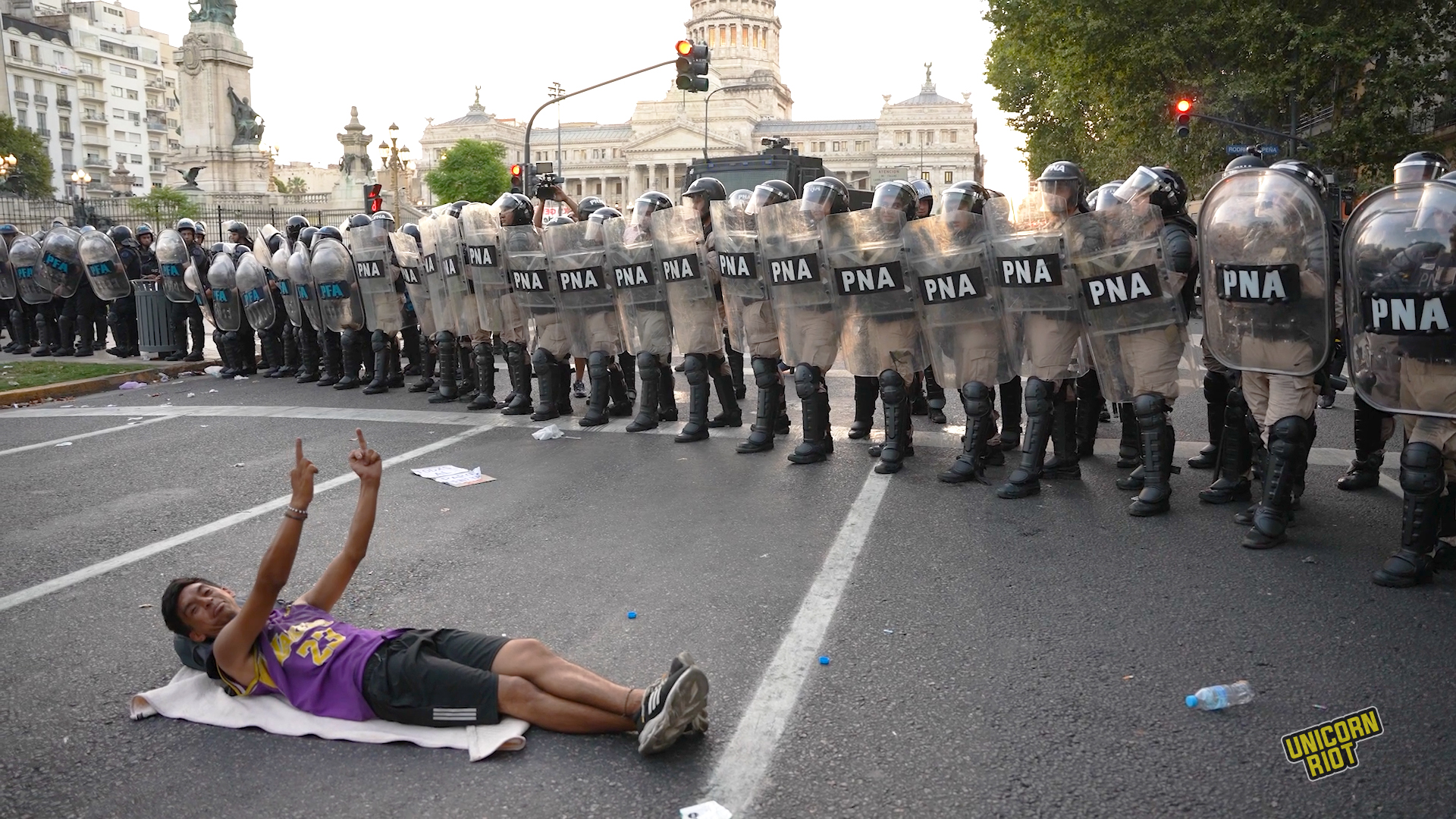Chainsaw Democracy – Argentina in Crisis Faces an Authoritarian President
After years of economical problems Argentina entered a new phase of a full-scale economic crisis. “People don’t have enough to eat, wages are low and there is a lot of inflation,” taxi driver Claudio Suárez summed up the current situation. On the way to the general strike he explained the crisis in a nutshell: “What this government did is to devalue our currency. Hence they increased prices, fuel, food, medicine, but not salaries and pensions. So we are worse off. Worse than two months ago when the new president took over, much worse.”
In late January and early February 2024, Unicorn Riot heard from Argentinians on the frontlines of mass protests against the economic plans of newly elected President Javier Milei.
This article is a commentary reflecting the lived experience, research and/or perspectives of the authors. The views and opinions expressed don’t necessarily represent those of Unicorn Riot.
Responsible for the new government politics is a rising star of the so-called “libertarian right” Javier Milei. Through austerity measures and presidential decrees, he managed to get the unions and civil society to rise up in no time. Only five months after his inauguration, a massive general strike on January 24, was the fastest organized strike during a president’s term in Argentina since the return of democracy in 1983.
This big day for the opposition was the start of continued protests that challenged one of Milei’s biggest plans: a so-called “omnibus” bill, which will privatize large portions of the economy and cut public spending dramatically in all sectors. The protests are still ongoing, and have been answered by police repression.
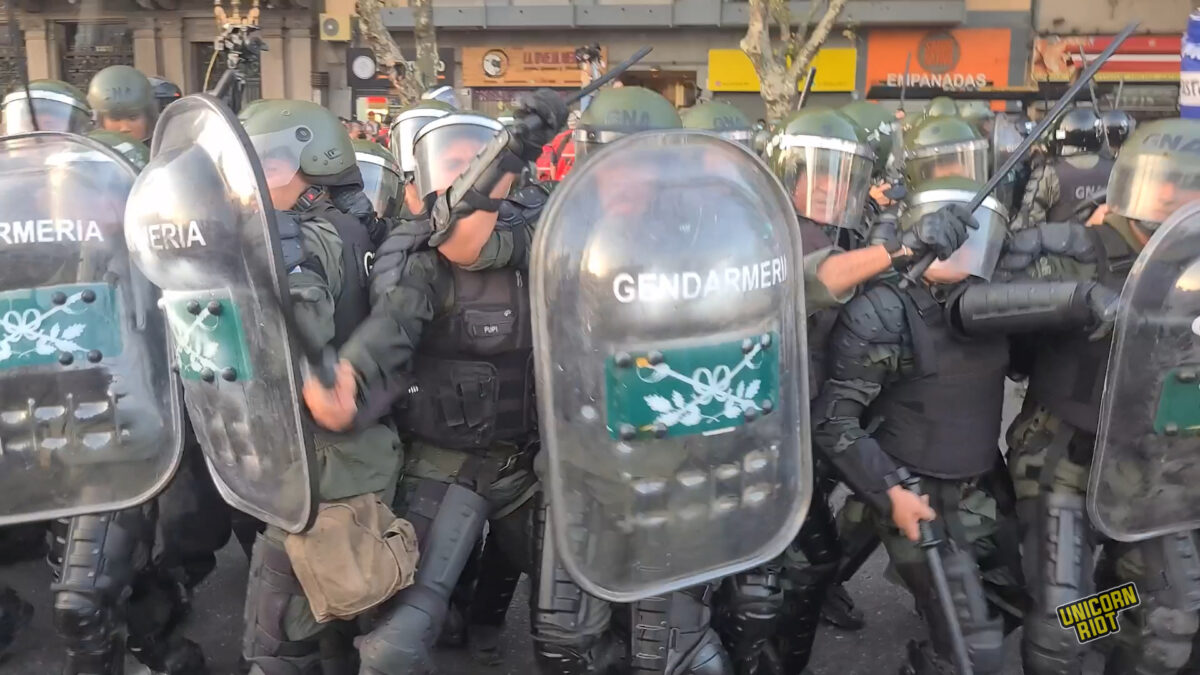
Milei, with his party La Libertad Avanza (Liberty Advances, LLA for short), promised to change Argentinian politics and economy with a chainsaw. For the people on the streets it quickly became clear that this chainsaw is supported by tear gas, water canons and rubber bullets.
Argentinians have suffered for years from a new phase of financial and economic crisis that has led to an explosion of inflation and higher prices in supermarkets without an increase of wages, which has expanded poverty. This is the biggest crisis since 2001, where the supermarkets were stormed by angry consumers, factories were occupied and self-managed blockades took place all over the country.
I. The New President and His ‘Mega Bill’
Locals often describe Javier Milei as “loco,” or crazy. At the same time, the self-proclaimed “anarcho-capitalist” was elected by over 50% of Argentinians, including a lot of workers, most of them young people working in undeclared and precarious jobs..
But how did this come about? Similar to Donald Trump’s populist speeches and political platform, Milei was able to score points with many people who ultimately had to reject him because of his political agenda. Although he likes to describe himself as a political outsider who wants to fight the Argentinian “political caste” with his policies, he is pursuing a highly neoliberal course with his privatization plans, his austerity policy and the planned legislative changes, which show little concern for the Argentinian population.
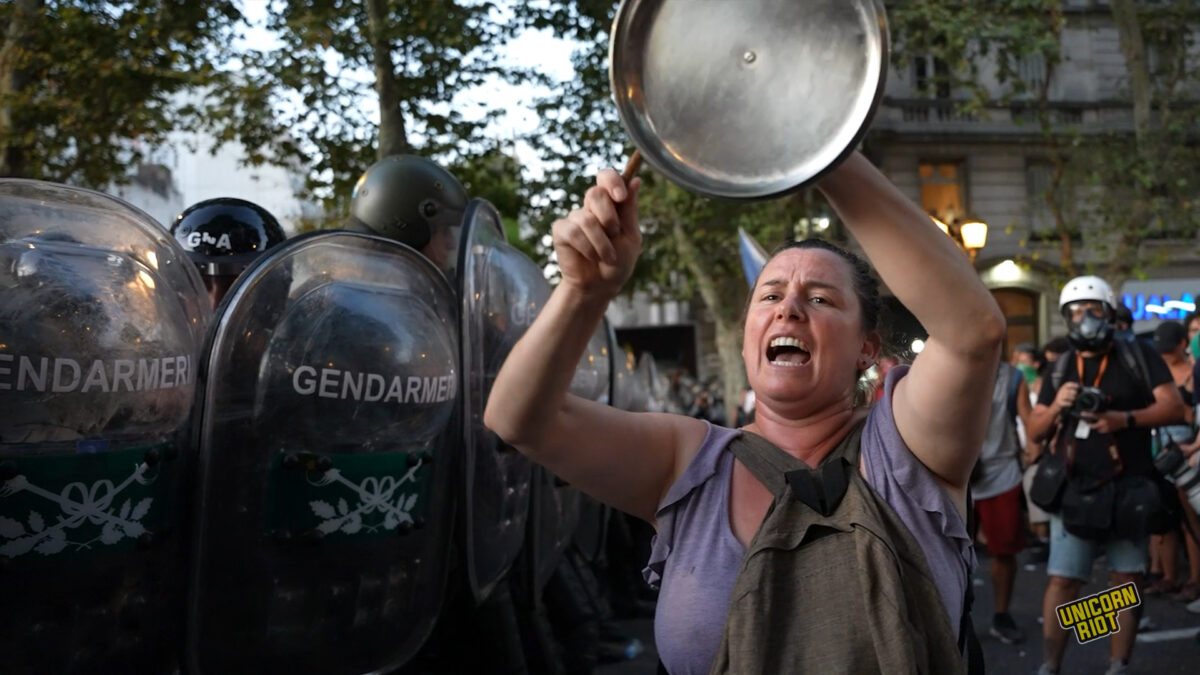
Recent Argentine history is characterized by Perónism, a construct that is difficult to grasp, especially for non-Argentines, and one that isn’t easily defined in terms of political left and right. This political and social movement, which Peron called the “third way,” emerged in the 1940s with its namesake Juan Perón, an ardent anticommunist, who first took over the government in 1946, and his wife Evita Perón. Even today, both are celebrated as heroes.
The general strike, which was Perónist-dominated, took place under huge portraits of the couple, especially Evita. Evita is still revered by many today for her commitment to social projects and the liberation of women. Juan Perón made changes to the welfare state but was also a fan of Mussolini and Hitler. In recent decades, the country has alternated between a more right-wing Perónism and a more left-wing Perónism (as seen during the presidential era of Fernando and Christina Kirchner). Many people in Argentina still support the almost religious idea of Perónism while to others it stands for corruption and clientelism. Those who opposed it wanted a change and hoped it would come from Milei.
The initiation of “Milei’s shock therapy” was announced in the first week of government by Finance Minister Luis Caputo with ten immediate measures, including the establishment of nine ministries instead of 18, a shutdown of public construction, the devaluation of the peso by more than 50 percent in real terms and slashing subsidies for transportation, gas and electricity.
Milei’s declared main political goal is to dismantle state structures and cut down public sector spending. In the center of this project: the proposed mega-bill would give the executive branch an enormous amount of power if passed. The bill provides changes to several hundred laws for downsizing the state apparatus, reducing regulations, cutting subsidies, privatizing state-owned companies and cutting social benefits.
The draft follows the equally controversial Necessity and Emergency Decree, which has been officially in force since December 29, but dozens of urgent appeals have already been filed against that decree with the judiciary. The Peronist General Confederation of Labor (Confederación General del Trabajo, CGT) and other trade unions also submitted an application to the National Chamber of Labor to suspend parts of the emergency decree. This was granted, and six articles were declared unconstitutional. Among them were restrictions on the right to strike and hold to assemblies, the abolition of collective agreements and the possibility of dismissals due to blockades and takeovers.
What must be noted is that Perónist Unions are under huge criticism. In Argentina, everyone has to pay a levy for the unions, even if they are not members. This also goes to the sinecure of the Perónist Unions, which are now multi-million dollar companies with their own healthcare system. This allows for corruption and clientelism, a valid criticism which Milei weaponizes for a general attack on the welfare system.
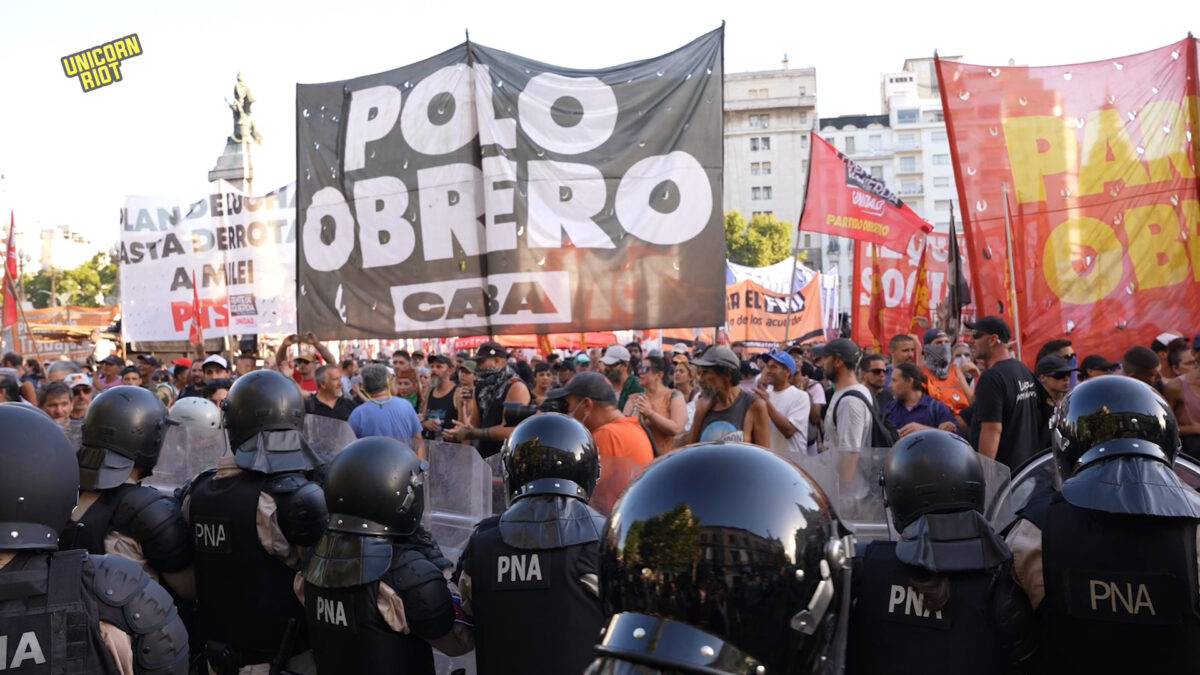
II. General Strike
The general strike has long been an important political instrument of the opposition in Argentina. Since 1983, it’s been used by the unions 42 times. The strike on January 24 was announced by the CGT as an answer to the planned mega-bill, devaluation of the peso and the shock therapy of the Argentinian economy.
Unions usually avoid the Congress Square because it is huge and protest rallies often seem smaller than they are. But on this very hot January day, the square and its surrounding streets exploded with crowds who had come to make a statement to the president.
On one of main thoroughfares of the country’s capital, Avenida Rivadavia, the political and social movements stood close together with columns of trade unionists, cultural associations and grassroots groups extending to the front of The Congressional Palace. The trade unions were at the front. Chanting, drumming, huge banners and the inevitable barbecue stand characterized the scene at this first major protest against the new government.
Thousands of people are in the streets today all over Argentina for a #GeneralStrike called by unions, most notably the CGT, against the neoliberal policies of the new elected president #JavierMilei. The biggest march is in front of the national congress in Buenos Aires. #24E pic.twitter.com/JE7LdFRmei
— UNICORN RIOT (@UR_Ninja) January 24, 2024
According to the CGT, 700,000 people participated in the protest while the police reported only 50,000. Eyewitnesses, including the authors of this text, estimated several hundred thousands – the place was so packed that even side streets were not accessible.
January is vacation season in Argentina, one of the hottest months of the year. Some companies are even closed for the whole month and many are on vacation. Nevertheless, this strike was a loud and colorful bang. At the same time, the strike also seemed to be a symbolic act – a protest ritual – while in big parts of Buenos Aires most of the shops were open or people seemed oblivious and careless of the strike.
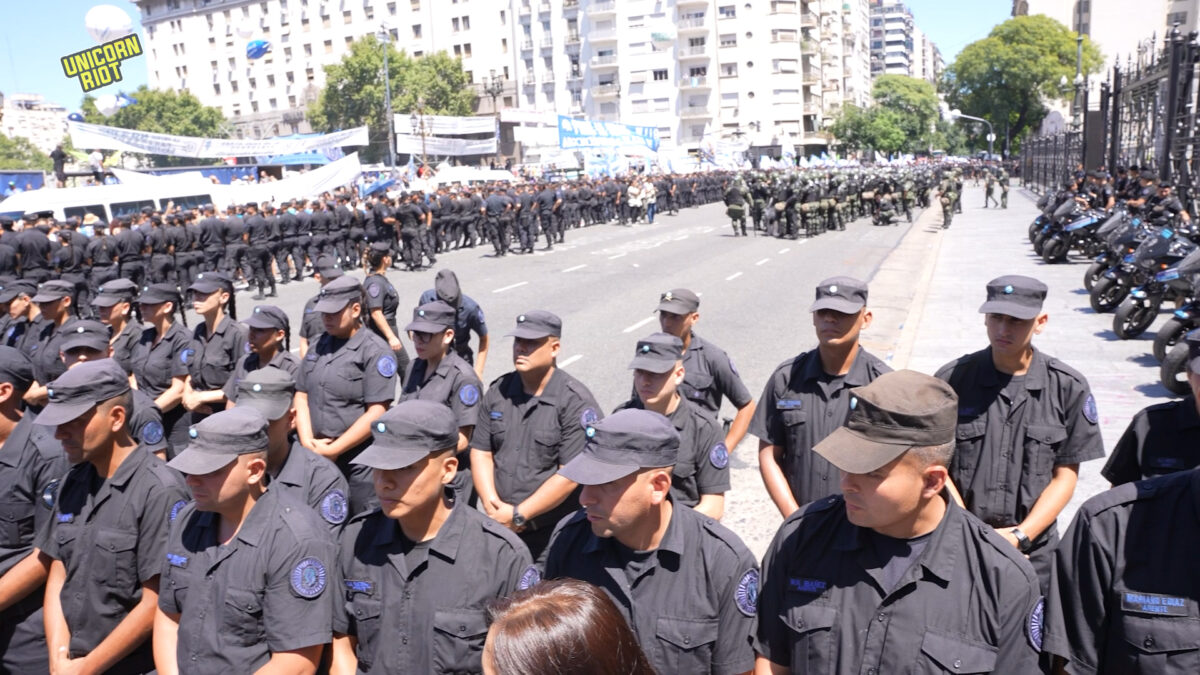
III. Three Days Battle of Congress
Less than a week after the general strike, negotiations on the mega-bill began in Congress. Once again there were calls to protest in front of Congress. While the police kept a low profile on the day of the general strike, the following days of the congressional debate quickly revealed a stronger presence of the state, in the form of thousands police units. The general strike was also called for by those who would later shape the protest in the three-day congress debate: left-wing groups, district assemblies and the Trotskyist, inner-parliamentary opposition. Big parts of the unions were absent.
While the debate raged inside, a diverse and initially peaceful protest formed on Congress Square each day. The demonstrators repeatedly attempted to occupy the neighboring streets, but police confronted protesters and prevented them from doing so. Hardline Security Minister Patrica Bullrich enforced her security protocol against the piqueteros, i.e. blockades and pickets. This policy of zero tolerance produced the images of a three-day showdown between demonstrators and the state.
#Argentina: Thousands of protesters are currently in a face off with hundreds of riot police in front of the Congress of Argentina in Buenos Aires as lawmakers debate new President Javier Milei's large bill that would reform politics, the economy and aspects of private life. pic.twitter.com/rFvXUd8T8a
— UNICORN RIOT (@UR_Ninja) February 1, 2024
The cat-and-mouse game was repeated every day: demonstrators forced their way onto the streets and the police tried to force them off the streets. This led to police violence and excessive use of a strong pepper and tear gas spray on the very first day: A sticky yellow mixture that causes long-lasting, painful, chemical burns and attacks the respiratory tract.
As the potential end of the vote approached, the pressure and violence exerted by the security forces increased. Due to previous experiences, many young protesters came better prepared on the second day. Protesters wore goggles and gas masks to protect themselves from the pepper spray and were noticeably more determined to defend the street as a place of protest.
The police relied on using truncheons, water cannons and motorcycle units that fired rubber bullets into the crowd, also hitting bystanders. More than 20 journalists were injured along with dozens of protesters. The authors of this text were also directly attacked several times with pepper spray and rubber bullets, despite being labeled as journalists.
Police on the back of motorbikes fired rubber bullets on crowds of protesters as they rode in circles with riot police patrolling the median outside Argentina's Congress in #BuenosAires. Protests against the new president's omnibus bill continued on Feb 1, 2024. #NoALaLeyOmnibus pic.twitter.com/8JFqtd9paV
— UNICORN RIOT (@UR_Ninja) February 2, 2024
On the third day of the congressional battle, Milei won a majority vote for the basic approval of the law by 144 votes to 109. Then the votes on the individual articles of the legislative package came to a head. Of the planned 664 amendments to the law, only 386 remained for the individual votes which took place in a process that happened far from the public debate and was opaque for many.
On February 7, a fateful day for Milei, his party did not want to make any further concessions. Oscar Zago, the LLA’s parliamentary group leader, had the law put back to committee, returning everything to square one. Interior Minister Guillermo Francos justified the move by stating that the “most important powers that allow deregulation of the economy” had been rejected. Francos spoke of “voting promises that were not kept in practice.”
Milei himself was on a state visit to Israel at the time his bill was defeated. He’s since stated that he sees MPs and also governors who had withdrawn their consent as traitors to the Argentinian electorate: “The caste is against the change that Argentinians voted for at the ballot box. (…) Our government program was voted for by 56% of Argentines and we are not prepared to negotiate with those who have destroyed the country.”
With such bluster, Milei wants to disguise the fact that his parliamentary group only has 38 of the 257 MPs. Such a minority means that his party is dependent on cooperation with other political groups – this also seems to be the main reason why he lost this battle, because the inexperienced Milei thought that he could govern this country single-handed.
The fact that he is threatening to implement his laws with or without the other parliamentary groups shows how much he would like to organize democracy with a chainsaw. The crackdown on demonstrators in front of Congress then fits the picture all too well.
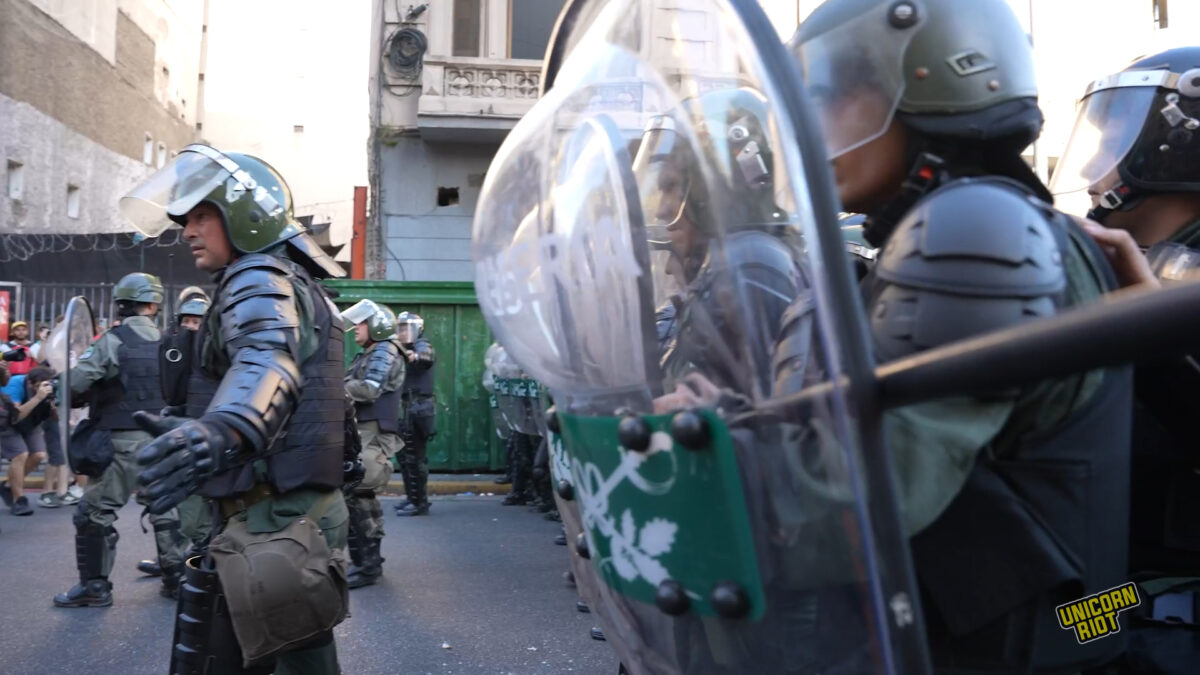
IV. Perspectives
The decree has yet to be officially overturned. The global elites, foremost the International Monetary Fund, welcome Milei’s shock therapy. The British magazine The Economist published an article, “After 100 brutal days, Javier Milei has markets believing,” which explains the “success” story of the newly elected president that inflation in February was “just 13%.”
Even if the Argentinian economy reaches a GDP surplus under Milei’s government it will happen at a cost. According to a study of the Catholic University of Argentina the poverty rate in January reached 57%, while when Milei took power in December 2023 it was at 49.5%.
The economy will further shrink due to the lower purchasing power. At the end of the day it is unclear if his shock therapy will be successful and if his political career will survive the ongoing poverty and popular pushback.
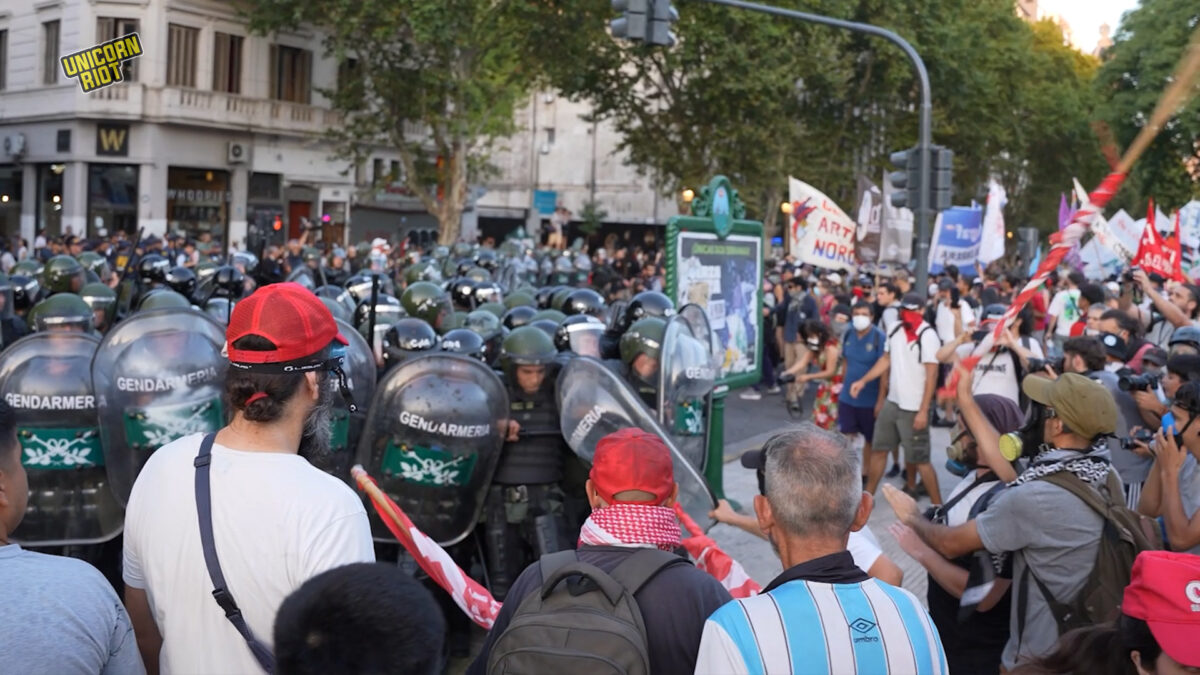
For now, Milei is being presented as the big cleaner with a chainsaw in his hand. His popularity stays high because he promised to counter the political “caste” that brought Argentina into this difficult situation in the first place. His noble fight against the “caste” is nothing new: Even if he is disguised as “libertarian,” Javier Milei is part of a right-wing populist shift in South American politics that follows in the footsteps of Donald Trump. The weeks after his loss in Congress showed that he is determined to hold to his authoritarian course: on March 3, the public news agency Telam was closed down and on March 6 he publicly said at a school that “abortion is aggravated murder.”
A friend said that “a chainsaw policy” was the right thing to do against all the corruption, but that it was “in the wrong hands.” As long as this is the case, the people in Argentina will continue to fight back and Milei will have to continue to achieve his political “successes” with (police) violence.
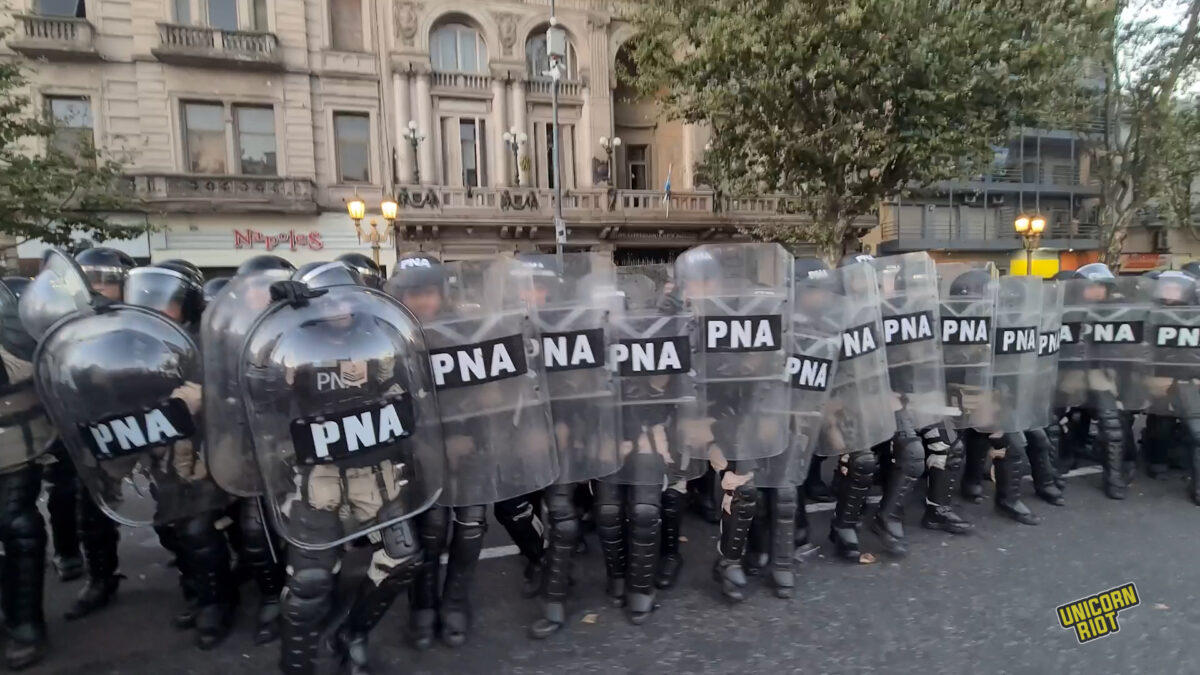
Follow us on X (aka Twitter), Facebook, YouTube, Vimeo, Instagram, Mastodon, Threads, BlueSky and Patreon.
Please consider a tax-deductible donation to help sustain our horizontally-organized, non-profit media organization:

